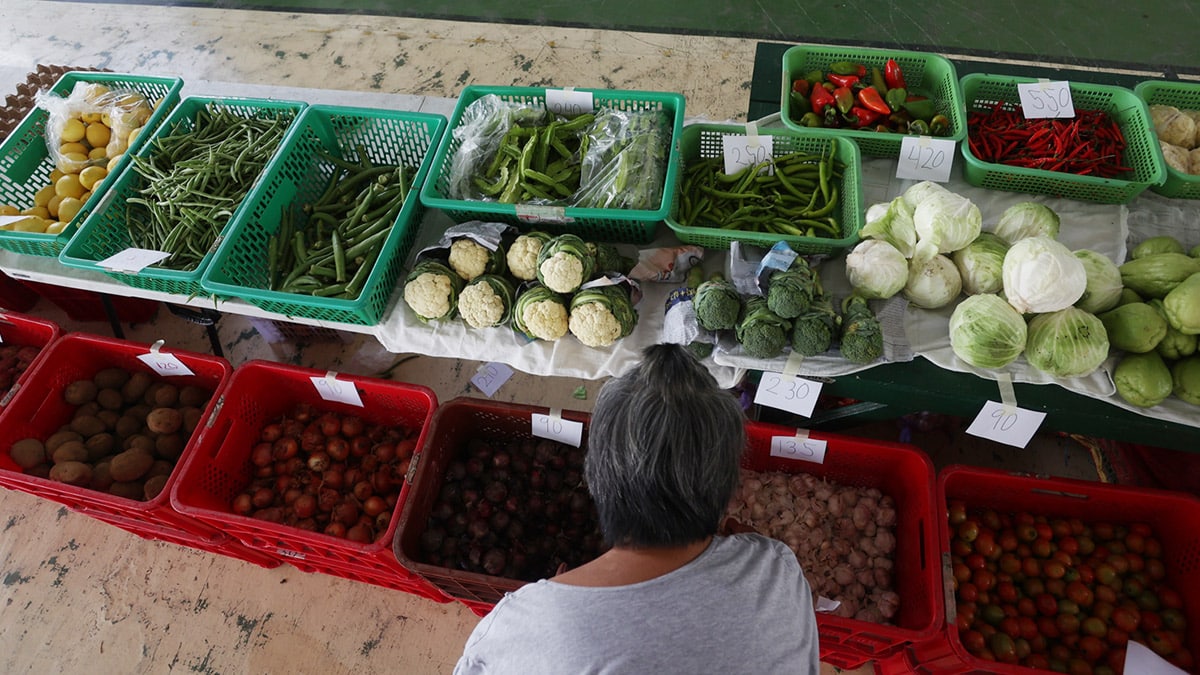
A ‘KADIWA’ IN THE NEIGHBORHOOD A customer chooses among the cheaper vegetables sold last week at the Kadiwa Store inside the Bureau of Plant Industry compound in Malate, Manila. —Niño Jesus Orbeta
MANILA, Philippines — The Department of Agriculture (DA) is targeting to increase the number of Kadiwa ng Pangulo (KNP) stores nationwide from the current 108 to 179 by the end of this year, as it seeks to bring discounted agriculture products to more Filipino consumers.
Meanwhile, the three-day Kadiwa ng Pangulo Expo 2024 began at the Philippine International Convention Center on Tuesday as one way of boosting the income of farmers and fishers while giving consumers access to quality and affordably-priced food.
An additional 71 KNP sites will be operationalized by yearend, with the expansion geared toward major cities outside the National Capital Region (NCR), Agriculture Assistant Secretary Genevieve Guevarra said on Monday.
READ: DA to open 20 ‘coop-led’ Kadiwa outlets in Metro Manila, Laguna
She said the DA aims to expand further the number of KNP sites to 300 by April or the middle of next year.
“Our expansion is geared toward major cities outside Metro Manila,” Guevarra said in a press briefing, adding that Agriculture Secretary Francisco Tiu Laurel Jr. wants to operate KNP sites regularly.
This is part of a wider plan to open 1,500 KNP sites across the country by the end of the Marcos administration in 2028, she said.
Logistics challenge
There are currently 41 existing Kadiwa centers in different parts of the country while the National Irrigation Administration is operating another 67 centers, bringing the overall number to 108.
The majority of these are located in the NCR. There are also Kadiwa sites in portions of Rizal, Laguna, Cavite, and San Jose del Monte in Bulacan, and Cebu in the Visayas.
Guevarra said the DA and its partners are facing challenges in maintaining stocks of agricultural commodities, particularly rice, and transporting them to KNP sites.
“The challenge, of course, is maintaining stocks, especially with rice and transporting the food items and where to source them … That is what we are working on now,” she said.
“But it’s definitely doable. We are encountering some logistics challenges in terms of shipping agricultural products. But our logistics plan is already laid out and we’re in the process of procuring additional products,” she added.
The establishment of many KNP sites in various parts of the archipelago is in line with President Marcos’ goal to make these stores more accessible, especially in typhoon-hit areas, so that consumers can buy these products at discounted prices.
“As the President has directed, especially after Severe Tropical Storm Kristine, the Kadiwa stores should really be open and accessible to those affected by the storm because … we all know that prices of goods go up after a storm due to the [limited] supply,” Guevarra said.
‘Check and balance’
Although agricultural products sold in Kadiwa sites are 20 to 30 percent cheaper than prevailing market prices, they are not intended to directly compete with public markets.
“This is one way of comparing reference prices in markets because sometimes market prices are too high,” Agriculture Assistant Secretary Arnel de Mesa said.
“This is also a good way to [provide a] check and balance on retail prices in public markets,” he added.
At the KNP Expo, more than 100 farmer exhibitors will be showcased and more Kadiwa “models” will be unveiled such as Kadiwa food hubs, model trucks, carts, and the Kadiwa app.